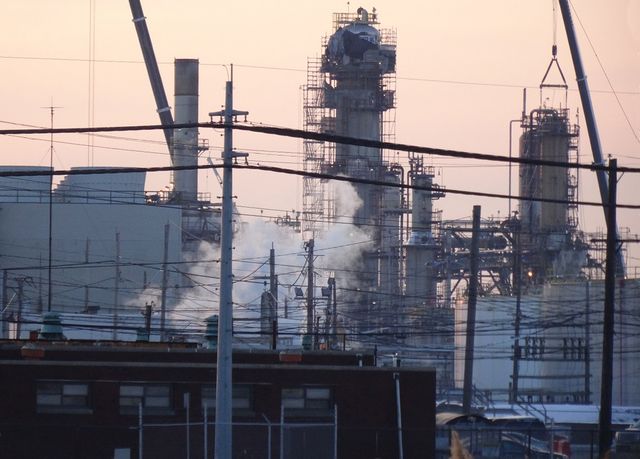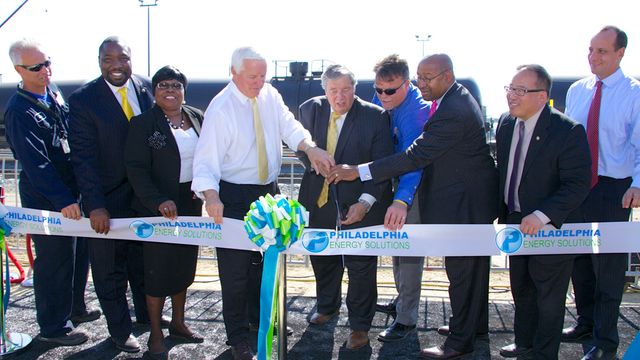Shannon Jones
Lessons of the Philadelphia refinery buyout
Anger is mounting among oil workers over the refusal of the United Steelworkers (USW) to expand the month-long strike into a national walkout against the multinational oil giants. The limits imposed by the USW are only increasing the arrogance of the employers, who are now threatening to permanently replace striking workers.
The refusal of the USW to mount a serious struggle is driven by definite material and social interests. The USW functions not as a workers’ organization, but as a business, whose executives prosper from the income and investment opportunities they receive in exchange for imposing concessions on the workers they allegedly “represent.”
 Sunoco Oil's Girard Point refinery in Philadelphia
Sunoco Oil's Girard Point refinery in Philadelphia
While the USW long benefited from its corporatist relations with the steel bosses, by the 1990s and 2000s the union’s headquarters in Pittsburgh began to resemble an investment banking boutique on Wall Street. With advice from former Lazard Freres partner Ron Bloom, the USW courted investors to finance its proposed merger of 80 steel companies. While billionaire asset strippers made fortunes and USW executives got corporate board seats and fatter stock portfolios, hundreds of thousands of workers lost their jobs and pensions in the corporate restructuring.
In remarks to a steel industry conference in 2004, Bloom—then a special advisor to USW President Leo Gerard—said the best route for creating and sustaining viable companies was a partnership between labor and “providers of capital.” We recognize, he said, “in a capitalist society, over time, if capital does not earn a return it will stop showing up.”
Having proven their worth to Wall Street, the USW pursued the same strategy after oil workers were brought into the USW in 2005. An examination of the 2012 deal between the USW, Sunoco and the hedge fund The Carlyle Group in Philadelphia is particularly instructive.
In late summer of 2011 Sunoco announced it would close its two remaining refineries in the Philadelphia area and wipe out hundreds of jobs if a new owner could not be found.
The USW did not respond by mobilizing workers to oppose the shuttering of the facility, which accounted for 25 percent of the East Coast’s refining capacity. On the contrary, it turned to the Obama administration and private equity firms to work out a deal to “save” the refinery on the backs of the workers.
 USW Headquarters in Pittsburgh
USW Headquarters in Pittsburgh
One member of the USW negotiating team in the current oil strike, Jim Savage, president of USW Local 10-1 in Philadelphia, played a key role in forcing concessions on the Sunoco refinery workers and facilitating its acquisition by Carlyle.
The USW boasts of its close relations with the massive private equity firm notorious for hiring former heads of state, including former President George Bush, Sr., to provide lobbying and insider connections to back its deal making. It buys companies for a fraction of their value and resells them for enormous profits after slashing jobs, pay and benefits. In this operation, the target companies are typically loaded up with debt, which is then used to pay outsized fees to hedge fund investors.
Carlyle is heavily invested in the defense industry and made enormous profits off the two US wars against Iraq. Among those currently or formerly on its payroll include government officials hardly notable for their sympathy for workers, including former British Prime Minister John Major, former Secretary of State James Baker III, Fidel Ramos, former Philippine president, Karl Otto Pöhl—former President of the Bundesbank, and former Reagan-era Secretary of Defense Frank Carlucci.
Carlyle earned international notoriety in the early 2000s for its efforts to block the Pentagon from canceling the contract for the Army’s self-propelled artillery piece, the Crusader, which one of its units, United Defense Industries, was set to build. Pentagon officials wanted to scrap the huge howitzer as a relic of Cold War military strategies. In a blatant conflict of interest, Carlyle used George Bush Sr. to lobby the administration headed by his own son.
In the case of rental car company Hertz, Carlyle and a group of private equity firms took over the company in 2005. Then, just six months after the deal was consummated, they had the company take out loans to fund a special dividend payment to themselves of $1 billion. Later, they carried out the layoff of 2,000 of the company’s 31,500 workers in advance of an initial public stock offering (IPO).
In the deal to take over the Philadelphia refinery Carlyle created Philadelphia Energy Solutions (PES), two-thirds owned by Carlyle and a minority stake for Sunoco. The plan was for the facility to use cheaper domestically produced crude oil rather than more expensive imports. Refineries on the East Coast have had problems accessing oil from the US interior due to the limitations of existing pipelines. To take advantage of this supply Carlyle proposed to build a high-speed unloading terminal at the refinery that would enable it to process large quantities of oil from the North Dakota oil shale fields. It also planned to achieve savings by using available local sources of natural gas.
As part of the deal, the Obama administration agreed to loosen environmental restrictions on the refinery and the state of Pennsylvania advanced $25 million in subsidies and other incentives. For its part Carlyle did not have to put up a cent for the acquisition, only agreeing to invest in upgrades.
At a public ceremony held shortly following the deal, USW President Leo Gerard could hardly restrain his enthusiasm, declaring, “They haven't come in to strip and flip the plant. They've come in to make it work.”
Among the concessions reportedly surrendered by the USW were the elimination of the defined benefit pensions plan and the substitution of an inferior 401(k) plan. The union also agreed to reduce overtime from double-time to time-and-a-half for certain shifts and to permit the contracting out of some work. In a statement expressing the utter servility of the union apparatus Jim Savage told the Delaware County Times he would have taken any proposal back to his members, no matter how bad it was. He called the final settlement, “a pretty decent deal. They treated us with dignity and respect when they didn’t have to.”
 Opening ceremony with CEO of Philadelphia Energy Solutions Philip Rinaldi, center, former Governor Tom Corbett, left, USW Local 10-1 President Jim Savage right in blue shirt.
Opening ceremony with CEO of Philadelphia Energy Solutions Philip Rinaldi, center, former Governor Tom Corbett, left, USW Local 10-1 President Jim Savage right in blue shirt.
Following the ratification of the sellout deal, USW Local 10-1 held a award dinner honoring Phillip Rinaldi, CEO of Philadelphia Energy Solutions, and David Marchick, Managing Director of the Carlyle Group and a former Clinton administration official. After noting that there had been “considerable debate” about the union honoring corporate execs and financiers, USW local president Jim Savage said, “We have the courage to recognize people that do the right thing no matter who they are.”
By all accounts the Philadelphia operation is now highly profitable. Last year Carlyle reported that it was selling shares in the oil unloading facility it installed at the Philadelphia refinery. The deal is structured so that the newly formed company can use loopholes to avoid paying most corporate taxes. In February Carlyle announced an initial public stock offering for PES with a nominal goal of raising $100 million.
The relationship between the USW and Carlyle is another demonstration of the transformed role of the unions, which have been integrated into the structure of corporate management and the capitalist government.
Through such figures as Ron Bloom—who moved on from USW advisor to Obama’s Auto Task Force in 2009, which ordered the halving of new GM and Chrysler workers’ wages—the nexus of the union businessmen, finance capital and the Democratic Party—was displayed.
The fight to defend jobs and oppose concessions requires a struggle against this anti-working class gang-up. The conduct of the oil strike must be taken out of the hands of the USW through the formation of rank-and-file action committees to shut down the entire industry and appeal to the broadest sections of the working class to defend the oil workers.
Above all, an entirely different strategy is needed, based on the international unity of workers, political independence from both big parties and the fight for socialism, including putting the global energy industry under the democratic control of working people.
No comments:
Post a Comment